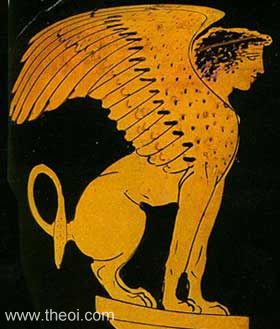When you're studying a particular society--its art, literature, history, mythology/religion, anything--you have to examine the cultural values in order to really understand it. Sorry to sound so much like a textbook, but I swear this'll get more interesting.
So a lot of people get really weirded out by Greek mythology because...well, take your pick of the reasons. Scandals galore? Check. Human-animal hybrids? Check. Crazy magic-science? Check. But we can't really look at the Greeks through the lens of American values, circa 2012--we can't expect people who lived thousands of years ago to have lived by our cultural norms. We have to apply their values to their stories--and then, some things start to make sense.
Take the Sophocles play Oedipus Rex, for instance. It's pretty disturbing. In fact, reader discretion is advised past this point. Baby Oedipus is abandoned by his parents and left to die of exposure, all because his father heard a prophecy that the baby would someday kill his father and marry his mother. Ugh. The parents, thinking they can prevent the prophecy from ever occurring, tie the kid's feet up and leave him to die in a field. However, unbeknownst to him, he is taken in by a peasant who feels sorry for him. Oedipus grows up and saves Thebes from the Sphynx's riddle, so he is feeling pretty clever. Little does he know, that guy he killed on the road who looked like a peasant was actually his father, the king. And little does he know, that cougar he married is actually his biological mother. He keeps trying to figure out why the gods are cursing Thebes with plagues, famine, and drought, since he doesn't know what they've done wrong. He spends the whole play trying to get to the truth.

When the truth finally comes out, however, Jocasta his mother/wife is so horrified that she hangs herself. His daughters are ruined forever, knowing nobody will ever marry them. And Oedipus blinds himself.
So...moral of the story? Americans might have trouble figuring out the point of all that melodrama. To the Greeks, however, the moral is obvious: you cannot outwit fate. You cannot outrun the gods. Apollo's oracle said this was going to happen--so it happened. There was no preventing it on anybody's part.
Also, Oedipus's (and his parents') fatal flaw was hubris--that's a very important Greek concept, so remember it--arrogance, believing (erroneously) that one is cleverer or stronger than the gods. Hubris is the downfall of many heroes in Greek myths because it's such an easy trap to fall into.
Finally, a bit of trivia: does anyone know the answer to the Sphynx's riddle, one of the oldest riddles in the world still surviving?
What creature walks on four legs in the morning, two legs at noon, and three legs in the evening?
Post the answer if you know it, or figure it out!
Ciao!
~Meg
So a lot of people get really weirded out by Greek mythology because...well, take your pick of the reasons. Scandals galore? Check. Human-animal hybrids? Check. Crazy magic-science? Check. But we can't really look at the Greeks through the lens of American values, circa 2012--we can't expect people who lived thousands of years ago to have lived by our cultural norms. We have to apply their values to their stories--and then, some things start to make sense.
Take the Sophocles play Oedipus Rex, for instance. It's pretty disturbing. In fact, reader discretion is advised past this point. Baby Oedipus is abandoned by his parents and left to die of exposure, all because his father heard a prophecy that the baby would someday kill his father and marry his mother. Ugh. The parents, thinking they can prevent the prophecy from ever occurring, tie the kid's feet up and leave him to die in a field. However, unbeknownst to him, he is taken in by a peasant who feels sorry for him. Oedipus grows up and saves Thebes from the Sphynx's riddle, so he is feeling pretty clever. Little does he know, that guy he killed on the road who looked like a peasant was actually his father, the king. And little does he know, that cougar he married is actually his biological mother. He keeps trying to figure out why the gods are cursing Thebes with plagues, famine, and drought, since he doesn't know what they've done wrong. He spends the whole play trying to get to the truth.

When the truth finally comes out, however, Jocasta his mother/wife is so horrified that she hangs herself. His daughters are ruined forever, knowing nobody will ever marry them. And Oedipus blinds himself.
So...moral of the story? Americans might have trouble figuring out the point of all that melodrama. To the Greeks, however, the moral is obvious: you cannot outwit fate. You cannot outrun the gods. Apollo's oracle said this was going to happen--so it happened. There was no preventing it on anybody's part.
Also, Oedipus's (and his parents') fatal flaw was hubris--that's a very important Greek concept, so remember it--arrogance, believing (erroneously) that one is cleverer or stronger than the gods. Hubris is the downfall of many heroes in Greek myths because it's such an easy trap to fall into.
Finally, a bit of trivia: does anyone know the answer to the Sphynx's riddle, one of the oldest riddles in the world still surviving?
What creature walks on four legs in the morning, two legs at noon, and three legs in the evening?
Post the answer if you know it, or figure it out!
Ciao!
~Meg
No comments:
Post a Comment